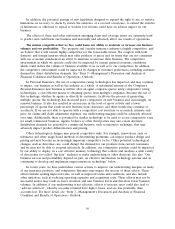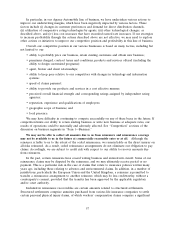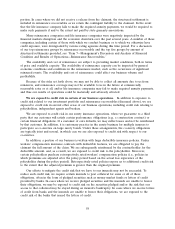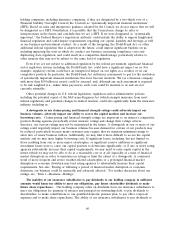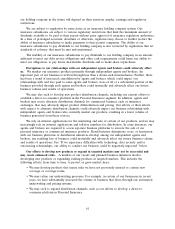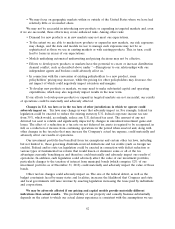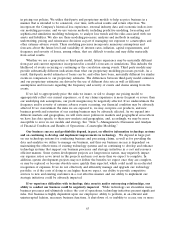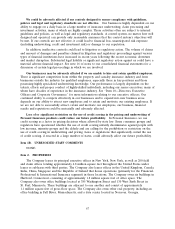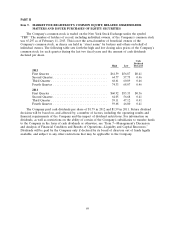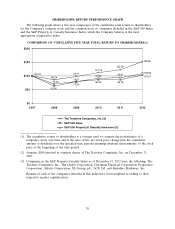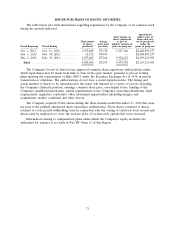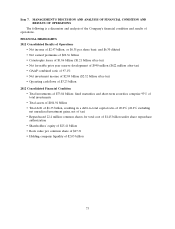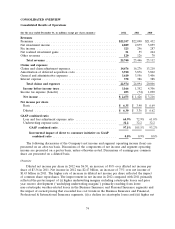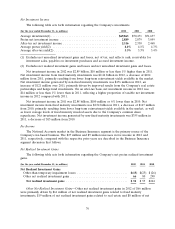Travelers 2012 Annual Report Download - page 78
Download and view the complete annual report
Please find page 78 of the 2012 Travelers annual report below. You can navigate through the pages in the report by either clicking on the pages listed below, or by using the keyword search tool below to find specific information within the annual report.assessment methodology and determining the consequences of a G-SII designation, the FSB along with
national authorities expect to publish the list of G-SIIs in April 2013.
While it is not yet known how these actions will impact us, such regulation could result in
increased costs of compliance, increased disclosure and less flexibility in our capital management.
Acquisitions and integration of acquired businesses may result in operating difficulties and other
unintended consequences. From time to time we may investigate and pursue acquisition opportunities
if we believe that such opportunities are consistent with our long-term objectives and that the potential
rewards of an acquisition justify the risks. The process of integrating an acquired company or business
can be complex and costly, however, and may create unforeseen operating difficulties and expenditures.
For example, acquisitions may present significant risks, including:
• the potential disruption of our ongoing business;
• the ineffective integration of underwriting, claims handling and actuarial practices;
• the uncertainty of an acquiree’s reserve estimates;
• the diversion of management time and resources to acquisition integration challenges;
• the loss of key employees;
• the cultural challenges associated with integrating employees; and
• the impact of an acquisition on our financial position and/or credit ratings.
The acquired business may not perform as projected, and any cost savings and other synergies
anticipated from the acquisition may not materialize. There is no guarantee that any businesses
acquired in the future will be successfully integrated, and the ineffective integration of our businesses
and processes may result in substantial costs or delays and adversely affect our ability to compete.
Changes to existing accounting standards may adversely impact our reported results. As a U.S.-
based SEC reporting company, we are currently required to prepare our financial statements in
accordance with U.S. Generally Accepted Accounting Principles (GAAP), as promulgated by the
Financial Accounting Standards Board (FASB). During the last several years, the Securities and
Exchange Commission (SEC) has been evaluating whether, when and how International Financial
Reporting Standards (IFRS) should be incorporated into the U.S. financial reporting system, including
for companies such as us. The FASB and the International Accounting Standards Board (IASB) have
also embarked on a long-term project to converge GAAP and IFRS. Additionally, the IASB and the
FASB are in the process of developing a global insurance standard that may involve methodologies for
valuing insurance contract liabilities that may be significantly different from the methodologies required
by current GAAP. In June 2012, the FASB issued a statement that indicated that based on the nature
and totality of differences between the FASB’s and IASB’s views, it is not likely that the two boards will
achieve convergence on this project. The FASB further noted that the FASB and IASB have very
different perspectives on the project, given that the U.S. has existing guidance on insurance contracts
whereas there is currently no comprehensive IFRS insurance standard for insurance contracts. As a
result of this, it is currently unclear what changes, if any, may be made to the accounting for insurance
contracts under GAAP as a result of this project, and we are not able to predict whether we will
choose to, or be required to, adopt IFRS or how the adoption of IFRS (or the convergence of GAAP
and IFRS, including the project for valuing insurance contract liabilities) may impact our financial
statements in the future. Changes in accounting standards, particularly those that specifically apply to
insurance company operations, may impact the content and presentation of our reported financial
results and could have adverse consequences to our reported financial results, including lower reported
results of operations and shareholders’ equity and increased volatility and decreased comparability of
our reported results with other insurers.
66


